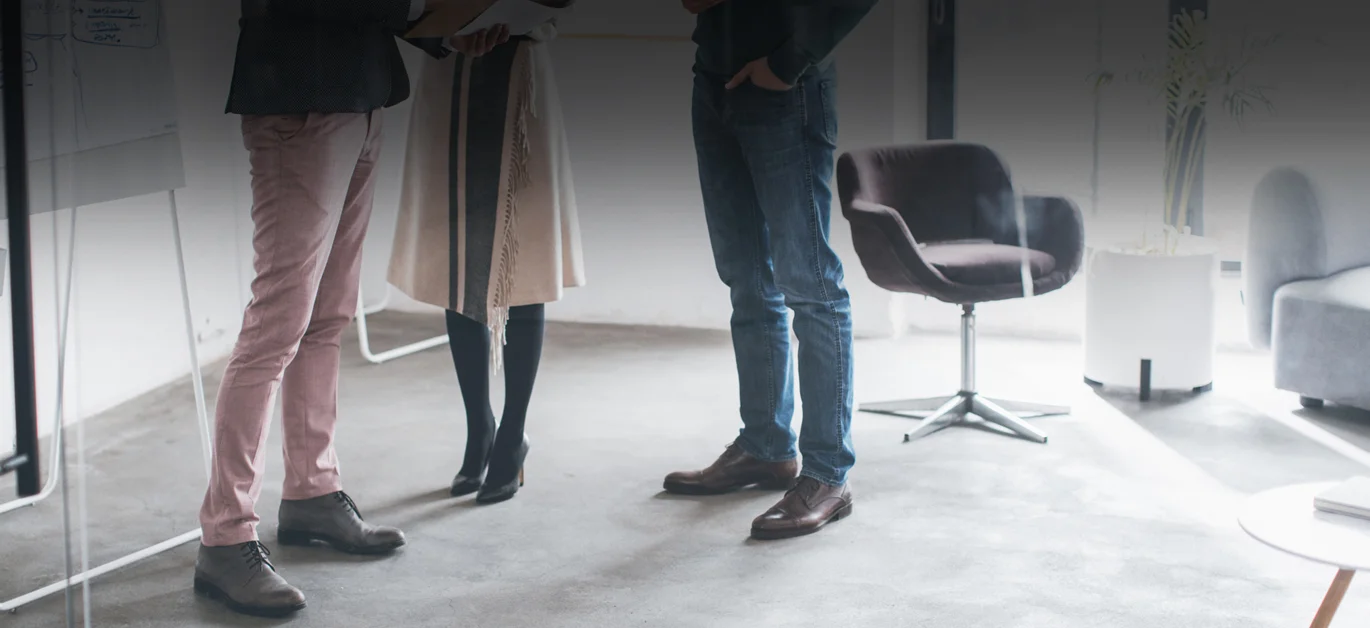
BLOG
How to use somatic intelligence to boost enthusiasm at work (and in life)
Who would you rather work with? The uptight perfectionist? Or the determined enthusiast?
In today’s world, there are so many reasons to feel down that enthusiasm takes effort and discipline to find.
Sometimes, we hunker down and try harder and harder, but then trying harder backfires, and we’re tired. And burdened. And depleted. Now what?
Here’s a short example of how perfectionism and trying hard make things worse.
It also highlights how somatic intelligence helps you catch yourself and flip from rigid to relaxed.
Remember: when you’re stuck, use your body to change your mind.
Also remember - finding enthusiasm takes practice. But once you embody it, it’s a contagious superpower.
Why you should get centered (with your team) at the start of a meeting
Have you heard the phrase or perhaps said it yourself - we’ve got to go slow to go fast?
Here’s one of my favorite ways to do just that. When I lead or facilitate a group coaching session, before we dive into the content of our session, we often start with a 3-minute guided self-awareness practice. Are you cringing? I was. Initially, anyway. Risky, right? Particularly with my most senior level sales leaders who had not dabbled in meditation. But when I tested the waters with them I was shocked with both the results and the response.
They became really quiet. And still.
Then they said: “Can we do that at the start of all of our calls?”
It was also surprising how much doing this helped me, even as leader of the call. I may have done my best to be present before getting on a call, but if the group was anxious or stressed, I would start feeling anxious too. I probably underestimated how much performativity was a factor. Whenever we really really want to do a good job - the body revs with stress hormones naturally even if we aren’t aware or attuned to it. Doing an awareness practice together helps everyone slow down, arrive, and let go of all the prior conversations, meetings and tasks.
I deliberately bring my clients attention to their body and their breath because I’ve found this to be the fastest way to help them (and me) settle the nervous system. It’s how we get “back online” out of anxiety or stress patterns. [For more background on how the brain and body react to uncertainty check out this short video]
Clients have not only asked for this, they’ve also emulated it at the start of their own meetings. They report the following results:
less fear and uncertainty
team is more engaged, connected
more intelligent and productive meetings
more collaboration and participation from everyone
we feel more relaxed, happier, flexible, fluid, creative
Intrigued and curious about this topic? Here’s a bit more on why presence matters and what one client taught me about the power of being still.
ps…
You don’t have to be a yoga teacher or meditation guru in order to guide the group. I’ve created a 3-minute script you can use. Easy peasy. Contact me if you’d like a copy.
Time Management Trick for New Habits
As we kick of a new year and a new decade, many of us gear up for personal and professional improvement. In order to improve something in your life a typical approach is to make time for a new practice. You have to add time to make it happen. If you want to lose weight, you start going to the gym. To make more money, you increase the amount of work. To be more present, you wake up earlier and meditate. But if you are a leader in any capacity your life is already full of things to do. For the perpetually busy, what could be more stressful than adding yet one more task?
An alternative approach would be to subtract. If you want to lose weight, eat less. If you want more money, spend less. If you want to be happier see what Bob Newhart says in this SNL skit. (If only it were that easy.)
But what if there’s another option; something neither additive nor deductive. Rather than starting something new, or stopping something old just shift what you’re already doing.
You already have to breathe, eat, drink and transport yourself from one place to another. You already attend meetings and have 1-1 conversations. How can you make the most of these moments? Here are a few examples of what our clients have done:
A seasoned VP felt constantly edgy and combative with the less experienced co-founders of his startup. A shift in his morning commute made all the difference. Instead of a news packed radio hour full of the latest shootings and world problems he listened to his favorite up-beat music. The music made him smile and he naturally felt more at ease and happy when he entered the office each day. He was less tense right out of the gate and therefore more open to their fresh ideas and perspectives.
For an engineer who wanted to speak more clearly and succinctly it wasn’t as simple as stopping his habit of speaking fast or rambling. For him, the shift was in posture, from slouching to standing straight instead. First, this unraveled patterns of tension and anxiety in his body. Second, it signaled to his brain that he didn’t need to be casual, slouchy or buddy-buddy with his co-workers. He needed to stand comfortably tall and in alignment. He practiced improving his posture daily during regular meetings. Nothing changed in his schedule, he just used meeting time more productively by practicing posture while listening and engaging. This micro shift practiced repeatedly over time led him to a game-changing conversation with a top level exec. He calmly and succinctly shared his idea and his skip-level superior quickly adopted it and rolled it out to the rest of the organization.
A new partner in a firm wanted to increase engagement with her team. When a move from the city to the suburbs increased her commute time she used her drive time as a valuable time to shift gears, connect, and have important conversations with her directs. She learned things about them and issues for the company as a whole that she would have missed had she not invested the time in connecting with them.
But wait, this sounds too simple. In Legacy, James Kerr tells the story about the famous All Blacks rugby team famous for their haka - a mighty ritual they use at the start of a match. According to Kerr such shifts are game changing. The All Blacks take their shifts to a new level by making them rituals. “You must ritualize to actualize.”
Step back…consider the flow and pattern of your day. Where could you simplify, slow down and be more deliberate? What small shift in effort will generate maximum return for you? What purpose are you trying to fulfill right now and what’s the easiest way to integrate that purpose into things you are already doing? This is where rubber hits the road. Cultivate habits that are uniquely powerful for you based on your specific purpose and your daily patterns. Then chart a path that starts where you are.
Success Stories
The executives I’ve coached who have had the most success are the ones who persistently incorporate a daily physical practice that helps them embody the person they wish to become.
Maya jokingly called herself a robot: "Coffee in, powerpoint out..." Eyes glazed, she overrode her fatigue with caffeine and anxiety-induced adrenalin to churn out data rich presentations. As she learned to listen to her body, she discovered that cold feet was her body’s warning sign that she was feeling stressed, and it became a trusted signal for her to set limits on her relentless workload. Though uncomfortable at first, putting her foot down and taking a stand garnered more respect from colleagues and clients, not less.
In Stuart’s case, speaking clearly and succinctly was paramount. He didn't realize it, but his tendency to slouch was part of the problem. His intention to make others feel comfortable or less intimidated didn’t actually work - for them or for him. He discovered that sitting and standing in alignment felt more comfortable and helped him stay calm during high-stakes presentations. This new calmness helped him focus and as a result he became more clear and concise.
For Alek, a tightly wound CEO, clowning around and making silly sounds and faces helped him lighten up as a leader, husband and parent of two kids. For all of my clients, self-awareness is fundamental. Managing their bodies is a game changer because it instantly reduces stress and allows them to be strategic and deliberate rather than tense and reactive. It also helps them feel more energized, creative, happy and whole.



